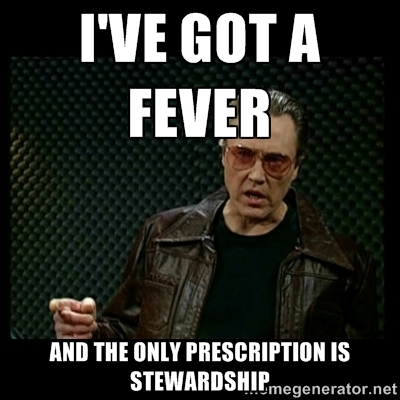|
For three weeks, I've been preaching a series on stewardship. We talked a lot about sharing the gifts of time, talent, and treasure that God's shared with us, and I encouraged our community to share these things not just with the church, but to cast a wider net and steward God's gifts to all those in need.
Today, I received two calls at the church today looking for some type of assistance. I've a confession to make. Though I know in my head that responding positively to these kind of requests is inherent to our Christian faith, and though I'm convicted in my heart that this undoubtedly the right thing to do, I still dread these calls. Not because we don't have the resources to share. We've set aside a monthly budget to help those who come to us. Not because I'm afraid of what people will do with the resources or time that we share. Not only do we have multiple safeguards in place to ensure that we're providing help, but more importantly, Jesus' command to give to those who ask didn't include any caveats. I can't even pinpoint exactly what it is that makes me uncomfortable here, though I know at least one of the reasons is that every time I respond to these requests, I do so on behalf of the church. It's not a personal sacrifice for me to say "yes" because the resources don't come out of my bank account. Sure, we already tithe at CLC, and will continue to grow in our stewardship. But when these calls come to me, I respond not out of my own generosity, but out of the sharing of our entire community. Perhaps this is a good thing, namely the anxiety. While at the church, I respond to benevolence requests as the pastor of our community. But when someone on the street asks for some lunch money, I can't give out of the church coffer. As I'm convicted to be a good steward of the gifts we share together as a community when a need arises, I should be just as convicted to share out of my own abundance when asked personally. I realized this morning that stewardship sermons, and perhaps all sermons, are just skeletons. Foundational for life together as the church? Absolutely. But without the sinews and vessels and muscles of flesh to help us live the sermon, then they remain only a skeleton. As the Body of Christ, we're called to build up one another, helping each other to live out the life of Christ here on earth, to become the hands and feet of Christ in the world. To put flesh on the teaching of the Gospel just as God put flesh on the heart of the Gospel in Jesus Christ. This is something we're blessed to do as church communities, and someone we're called to do as Christian individuals as well. Today, I'm thankful for the anxiety that's reminded me I'm called not only to be a steward of this community, but a steward of myself as well.
0 Comments
This Sunday, our church is finishing a three week series on stewardship. We've spent each week with a particular focus: one on time, one on talent, and one on treasure. It's been a blessing to see people come together and think critically about these various areas. This Sunday, we'll hand out our Giving Estimate sheets, and in two weeks, we'll dedicate the results of our stewardship campaign to God's work here in the New River Valley through Christ Lutheran Church.
Even as I preach on this topic and guide these discussions, I'm learning things. That's one of the blessings of being a pastor, that as you help to teach others, you may grow as well. One of the things that I've come to realize in this process is this: As God makes us good stewards, God is liberating us from the bondage of our culture. Check out this video that helps to put a visual image to this teaching. God's from Evan Vetter on Vimeo.
What we're talking about with stewardship is not just nominally saying something belongs to God. We're adamantly admitting that nothing belongs to us. This grinds against the grain of our consumeristic, capitalistic culture. We're told that acquiring things for ourselves makes us good citizens, that the more blessed we are equates to having more stuff. What we own isn't just innocuous matter. It's become the entire goal of our society. We've become slaves to the idols of things. It's a sickness, and stewardship is the cure.
In other words, the only way we can be liberated from the things that dominate our lives is if we stop seeing those things as belonging to us. When we stop seeing ourselves as the gods of our wallets and homes and talents and time, we realize that we're not God. The stuff that becomes so oppressive suddenly becomes evidence of the grace we've received rather than the trappings of a conceited culture. From this position, we can distribute these things, sharing what we have freely as a witness that God desires to redeem this culture.
That's the key. The identity of a steward is wrapped up in the care for and distribution of someone else's goods. Royal stewards care for the kingdom in the absence of the monarch, using the resources of the crown. In the same way, as stewards of God's creation, we are called to care for creation as the Body of Christ here on earth. The stuff that we have at our disposal is not ours, but Christ's. This identity as stewards of God's Kingdom liberates us from the burdens of our culture and frees us to become images of God, witnessing to the grace we've received. |
AuthorSimultaneously a sinner and a saint. Archives
September 2020
Categories |

 RSS Feed
RSS Feed